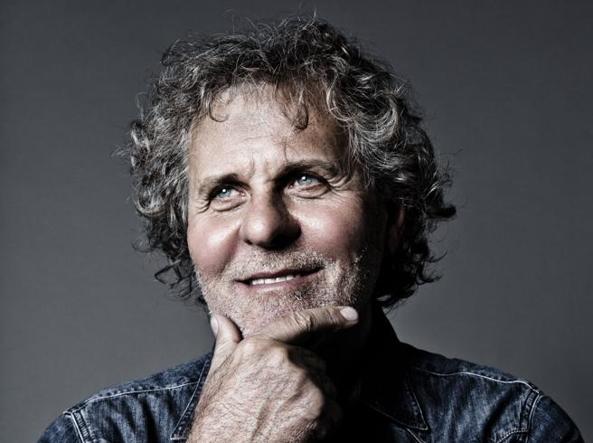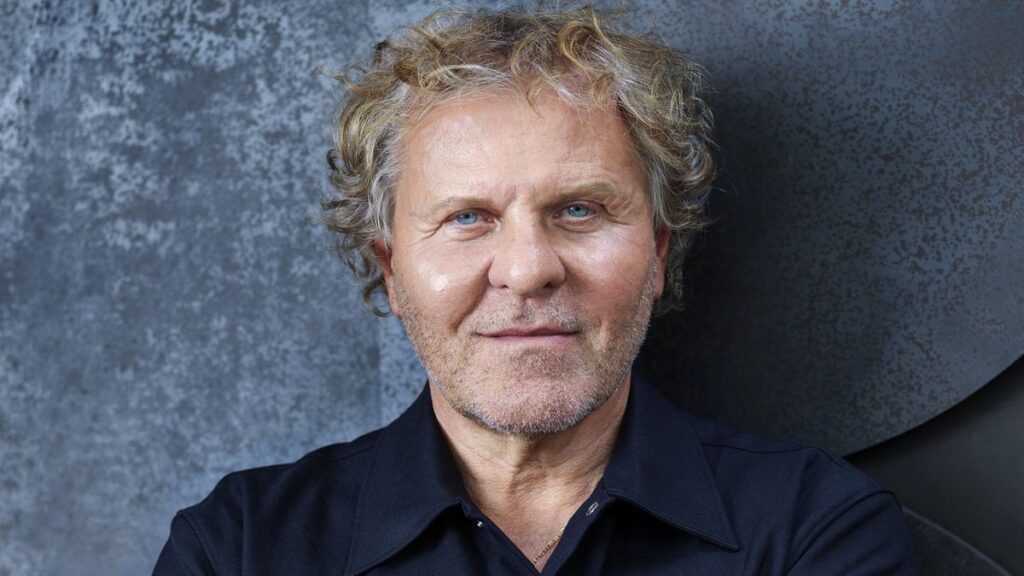In the gilded world of high fashion, a realm often defined by Parisian ateliers and Milanese prestige, Renzo Rosso stands apart. He is the disruptor, the rebel with a cause, and the visionary who convinced the world that a pair of pre-worn, artfully distressed blue jeans could be the ultimate luxury statement. Known as the “Jeans Genius,” the founder of Diesel and the president of the OTB Group is the architect of a global fashion powerhouse.
With a personal net worth estimated at a staggering $3.5 Billion, Renzo Rosso has cemented his place among the titans of the industry. This colossal fortune wasn’t inherited or acquired through a corporate merger; it was stitched together, thread by thread, from his unparalleled understanding of youth culture, a flair for provocative marketing, and a shrewd eye for acquiring and nurturing unique brands.
His is a story that begins not in a boardroom, but on a farm in rural Italy, with a sewing machine and a radical idea. This article explores the journey of Renzo Rosso, from crafting his first pair of jeans at age fifteen to presiding over a modern luxury conglomerate that challenges the very definition of fashion.

From the Farm to the Factory: The Origins of a Denim Prodigy
Renzo Rosso’s story is the embodiment of the entrepreneurial dream, beginning with the humblest of origins. Born in 1955 in Brugine, a small rural town in northeastern Italy, his early life was spent on his family’s farm. It was a world away from the glamour of the runway, but it instilled in him a pragmatic, hardworking ethos that would later define his business career.
His passion for fashion, and specifically denim, ignited in his teenage years. At the age of fifteen, using his mother’s sewing machine, he crafted his first pair of jeans—a low-waisted, bell-bottomed creation that was an instant hit among his friends. He began making and selling more pairs, getting his first taste of the thrill of turning raw material into a desirable product.
Realizing his calling, Rosso enrolled at a textile manufacturing college in Padua. This formal education provided him with the technical skills to complement his innate creativity. His first major step into the industry came when he began working for Moltex, a local clothing manufacturer owned by Adriano Goldschmied, who would later be known as the “Godfather of Denim.” Rosso was a creative force within the company, and in 1978, at the age of just 23, he and Goldschmied co-founded a new brand. They called it Diesel.
The name itself was a stroke of genius. In the late 1970s, an oil crisis gripped the world, and diesel was being touted as the alternative fuel. Rosso saw a parallel: he wanted his brand to be the alternative to the mainstream, established fashion giants. It was a name understood globally, embodying a spirit of rugged utility, innovation, and defiance. In 1985, Rosso bought out Goldschmied’s stake for $500,000, taking full control of Diesel and setting the stage for its global domination.
Fueling a Revolution: The Rise of Premium Denim
In the 1980s and 90s, the concept of “luxury jeans” was an oxymoron. Denim was a uniform, stiff, and largely uninspired commodity. Renzo Rosso changed that forever. He envisioned jeans as a canvas for artistry and individuality. Diesel pioneered techniques in distressing, washing, and treating denim to create a “pre-worn” look straight off the shelf. Each pair felt unique, imbued with a story and a soul.
This was a radical departure from the norm. Diesel jeans were significantly more expensive than their competitors, but Rosso correctly gambled that consumers would pay a premium for a product that offered not just quality, but also an identity. He was selling a piece of a rebellious, effortlessly cool lifestyle. This focus on premium, artisanal denim became the engine of Diesel’s explosive growth and the first major pillar of Rosso’s immense fortune.
The brand’s identity was further cemented by its now-legendary advertising campaigns. While other fashion brands sold glamour and aspiration, Diesel sold irony, wit, and social commentary. The “For Successful Living” campaign, launched in the 1990s, was a masterclass in branding. The ads featured surreal, satirical scenarios—from North Korean soldiers watching a fashion show to an instructional guide on how to be a dictator—that had almost nothing to do with the clothes themselves. Instead, they built a universe around the Diesel consumer: someone who was intelligent, globally aware, and didn’t take themselves too seriously. This audacious marketing strategy transformed Diesel from a clothing company into a cultural phenomenon, creating a fiercely loyal global tribe and driving sales into the billions.

Beyond Diesel: Building the OTB Luxury Group
By the early 2000s, Diesel was a global giant. Renzo Rosso could have comfortably rested on his laurels as the king of premium denim. Instead, his ambition drove him to a new challenge: to build a modern, Italian-owned luxury conglomerate that could compete with French giants like LVMH and Kering. To do this, he created a holding company named OTB, which stands for “Only The Brave,” a motto that perfectly encapsulates his personal and professional philosophy.
OTB’s strategy was not to acquire mainstream brands, but to invest in unique, avant-garde fashion houses with strong creative identities, providing them with the financial backing and infrastructure to flourish. The portfolio he has assembled is a testament to his eclectic taste and business acumen:
- Maison Margiela: Perhaps OTB’s most successful acquisition, the avant-garde Belgian house was brought into the fold in 2002. Rosso made the brilliant and controversial decision to appoint the flamboyant John Galliano as creative director in 2014, a move that revitalized the brand and turned it into a commercial and critical powerhouse.
- Marni: Acquired in 2012, this Italian brand is known for its quirky, artistic, and intellectual aesthetic, appealing to a customer who values creativity over fleeting trends.
- Viktor & Rolf: The Dutch couture house, famous for its theatrical and conceptual designs, joined the OTB family in 2008.
- Jil Sander: The iconic German brand, synonymous with minimalist luxury, was the group’s most recent major acquisition in 2021, adding a pillar of refined modernism to the portfolio.
- Amiri: OTB also holds a minority stake in the buzzy, LA-based luxury rock-and-roll brand.
By assembling this “alternative” luxury group, Rosso has diversified his wealth far beyond Diesel, creating a stable and growing empire that generates billions in annual revenue and is a major contributor to his $3.5 billion net worth.
The Maverick Investor: Red Circle and the Diesel Farm
A true entrepreneur never stops building. Renzo Rosso’s business interests extend far beyond the runway through Red Circle, his family’s private investment firm. Named after the distinctive red stitching on a Diesel watch he designed, Red Circle invests in innovative startups across a range of sectors, including technology, e-commerce, wellness, and sustainability. This demonstrates a forward-thinking approach to wealth management, diversifying his assets into the high-growth industries of the future.
But perhaps the project closest to his heart is the Diesel Farm. A return to his rural roots, Rosso purchased a sprawling farm in Marostica, near his childhood home. It is a passion project that produces high-quality wine, olive oil, and other organic goods under the “Diesel Farm” brand. This venture is not just a business; it’s a reflection of his personal values—a commitment to quality, sustainability, and the land that first shaped him.
A Legacy Woven in Denim
Renzo Rosso’s journey from a farmer’s son to a billionaire fashion titan is a masterclass in vision and audacity. His $3.5 billion fortune is the direct result of his ability to see the future before others did—whether it was the potential of a simple pair of jeans, the power of irreverent marketing, or the value of nurturing unique creative talent.
He built an empire not by following the rules, but by rewriting them. He infused the often-snobbish world of luxury with a dose of humor, rebellion, and raw authenticity. Renzo Rosso proved that with enough bravery, creativity, and a deep understanding of the human desire to stand out, you can stitch together a legacy that is as enduring as a perfect pair of blue jeans.


